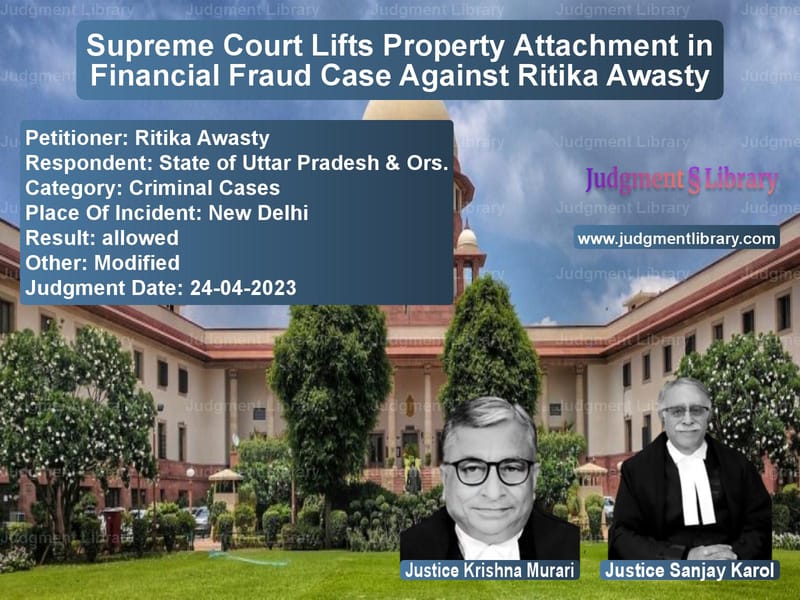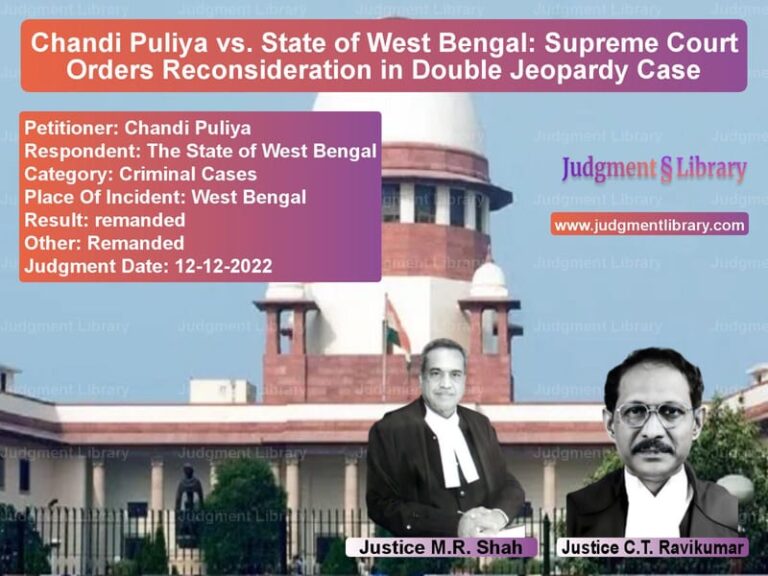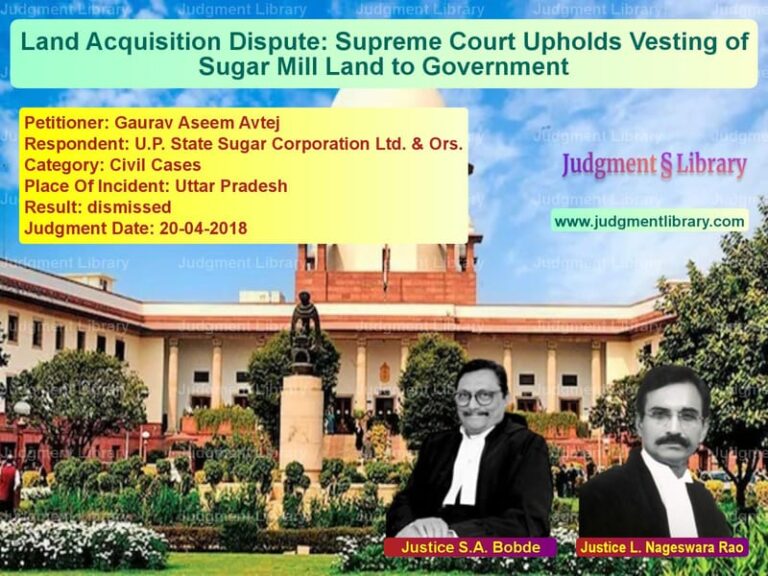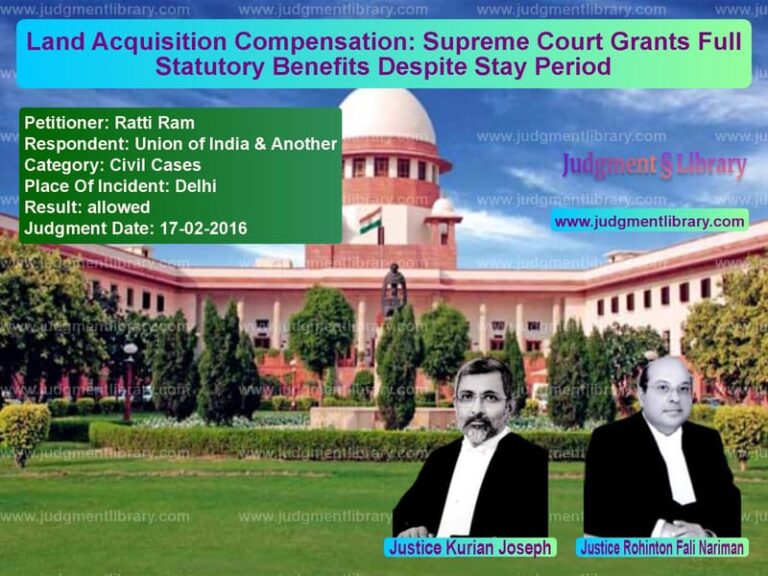Supreme Court Lifts Property Attachment in Financial Fraud Case Against Ritika Awasty
The Supreme Court of India recently ruled in favor of de-attaching properties that had been linked to the financial fraud case against Ritika Awasty and her husband, Virkaran Awasty. The case, titled Ritika Awasty vs. State of Uttar Pradesh & Ors., addressed multiple applications related to property ownership disputes, attachment orders, and the alleged fraudulent business dealings of the petitioner.
Background of the Case
The case revolves around allegations that Ritika Awasty and her husband defrauded M/s. Bush Foods Overseas Pvt. Ltd. in Bahalgarh by procuring food grains through fraudulent means. Following criminal complaints, FIRs were lodged against the couple, leading to legal proceedings across multiple courts. The State of Uttar Pradesh sought their extradition, and steps were taken under Section 82 of the Code of Criminal Procedure (CrPC) to declare them proclaimed offenders.
During the proceedings, the Supreme Court, in its order dated 15.12.2017, allowed the attachment of multiple properties believed to be owned by Ritika Awasty and her husband, including:
- 5/10 Shanti Niketan, New Delhi
- 5/1 Vasant Vihar, New Delhi
- C-1/2 Vasant Vihar, New Delhi
Over time, various individuals, including relatives and third-party buyers, filed applications before the Court to vacate the attachment, arguing that they were the rightful owners and had no involvement in the alleged fraud.
Key Legal Issues
The Supreme Court examined the following key issues:
- Whether the properties attached by the Court were directly linked to the financial fraud allegations against the petitioner.
- Whether individuals who had purchased or inherited these properties had any legal claim to have them de-attached.
- Whether the Court’s earlier order restricting transactions involving these properties should be vacated.
Arguments by the Petitioners Seeking De-Attachment
The applicants seeking de-attachment, including Virender Awasty, Veena Awasty, Urmil Tewari, and Monica Gogia, argued:
- They had no involvement in the alleged fraud: The applicants contended that they had owned their respective properties for several years, well before the alleged financial fraud case was filed.
- The attachment caused undue hardship: The order effectively froze their ability to transact or utilize their properties, causing financial distress.
- The properties were legally acquired: Some applicants, such as Monica Gogia, provided documentary proof that they had purchased the properties in question through valid sale deeds before any FIRs were lodged.
Arguments by the Respondents (State of U.P. and Enforcement Agencies)
The State of Uttar Pradesh and investigating agencies contended:
- The properties were acquired using proceeds from fraud: They alleged that Ritika Awasty and her husband had funneled fraudulent money into purchasing high-value real estate.
- Some transactions were sham deals: The State argued that some property transfers were structured to evade legal scrutiny.
- The attachment should remain in place: Given the ongoing extradition proceedings against the accused, the authorities contended that lifting the attachment could hinder the recovery of defrauded funds.
Supreme Court’s Ruling
1. De-Attachment of 5/1 Vasant Vihar, New Delhi
The Court ruled that the applicants who owned 5/1 Vasant Vihar, New Delhi had no connection to the fraud case. The Court stated:
“The ownership of 5/1, Vasant Vihar, New Delhi, resting with the applicants is not a disputed position of fact. The assertion that the applicants therein do not have anything to do with or are not in any way connected to the business dealings of petitioner – Ms. Ritika Awasty or her husband Mr. Virkaran Awasty also cannot be denied or disputed.”
Accordingly, the Court ordered the immediate lifting of the attachment on this property.
2. Lifting of Restrictions on C-1/2 Vasant Vihar, New Delhi
The Court also addressed the status of C-1/2 Vasant Vihar, New Delhi, which had been purchased by Monica Gogia through a registered sale deed dated 31.07.2015. The Court ruled:
“The sale deed in respect of this property was dated 31.7.2015, by way of which the rights of the applicant have solidified prior to the registration of FIRs in connection with unpaid dues of the company in which the petitioner was a promoter. With the bona fide ownership of Mrs. Monica Gogia being established, the continued operation of the order dated 15.12.2017 is prejudicially affecting the rights of ownership which the applicant undoubtedly enjoys.”
Thus, the restriction on transferring or selling the property was vacated.
3. Limited Scope of Order
The Court clarified that its ruling was limited to lifting the attachment orders and did not affect other ongoing criminal or extradition proceedings against Ritika Awasty and her husband:
“This order is only limited to the reliefs as indicated in the instant applications and shall in no way come in the way of any other investigations/proceedings connected with the main matter, not least the extradition proceedings that have been duly approved and are underway or any other proceedings indicated under the fiscal/penal laws of the land.”
Key Excerpt from the Judgment
Summarizing its decision, the Supreme Court held:
“The Interlocutory Applications, for the reasons recorded hereinabove, and also for the particular reason that prima facie no proximate link could be established to justify the attachment of property of the relatives of the petitioner herein, or the purchaser of her property, to compensate for the defaults that may account to her or her husband, are allowed.”
Conclusion
The Supreme Court’s ruling in Ritika Awasty vs. State of U.P. provides clarity on property attachment orders in financial fraud cases. The judgment reaffirms that properties cannot be attached indefinitely if their ownership is bona fide and unconnected to alleged criminal activities.
By lifting the attachments on properties belonging to innocent third parties, the ruling balances the State’s interest in prosecuting financial crimes with the fundamental rights of property owners. However, the Court also made it clear that this relief does not impact other legal proceedings against the accused.
Petitioner Name: Ritika Awasty.Respondent Name: State of Uttar Pradesh & Ors..Judgment By: Justice Krishna Murari, Justice Sanjay Karol.Place Of Incident: New Delhi.Judgment Date: 24-04-2023.
Don’t miss out on the full details! Download the complete judgment in PDF format below and gain valuable insights instantly!
Download Judgment: ritika-awasty-vs-state-of-uttar-prade-supreme-court-of-india-judgment-dated-24-04-2023.pdf
Directly Download Judgment: Directly download this Judgment
See all petitions in Fraud and Forgery
See all petitions in Bail and Anticipatory Bail
See all petitions in Money Laundering Cases
See all petitions in Judgment by Krishna Murari
See all petitions in Judgment by Sanjay Karol
See all petitions in allowed
See all petitions in Modified
See all petitions in supreme court of India judgments April 2023
See all petitions in 2023 judgments
See all posts in Criminal Cases Category
See all allowed petitions in Criminal Cases Category
See all Dismissed petitions in Criminal Cases Category
See all partially allowed petitions in Criminal Cases Category







